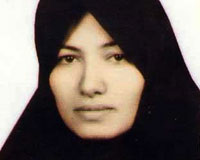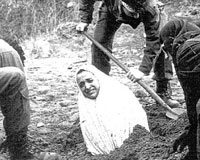Stoning not newsworthy in Arabic and Muslim media
by - 2nd August 2010
 The news about the stoning of Iranian woman, Sakineh Ashtiani, was reported in Western media, but no trace of it could be found in Arabic or Muslim media.
The news about the stoning of Iranian woman, Sakineh Ashtiani, was reported in Western media, but no trace of it could be found in Arabic or Muslim media.
On May 15, 2006, a criminal court in East Azerbaijan province found Sakineh Mohammadi Ashtiani, 43, guilty of having an 'illicit relationship outside marriage' with two men following the death of her husband. She was sentenced to flogging and was given 99 lashes.
In September 2006, during the murder trial of a man accused of killing Ashtiani’s husband, another court reopened an adultery case based on events that allegedly took place before her husband died and eventually convicted her of 'adultery while being married'. During the trial, Ashtiani retracted a confession she had made during a pre-trial interrogation, alleging that she had been forced to make the confession under duress. She has continued to deny the adultery charge. However, the decision still stands, and she is to be stoned to death any time soon.
The news about Ashtiani’s impending stoning caused an uproar in the West: it covered in all major media outlets like the Guardian, BBC, and CNN; demonstrations were held in various European capitals; Human Rights Watch and Amnesty International issued appeals; and actors Emma Thompson and Colin Firth, playwright Sir David Hare, author Philip Pullman, and philosopher A. C. Gayling expressed their concerns.
What is alarming and equally discouraging about the whole ordeal is that no trace of media reporting or public concern could be found in the Arabic and Muslim countries. The two main Arabic news agencies, Aljazeera and Alarabiya (and their English versions), did not cover the story at all –and neither did any of the Arabic news TV channels and newspapers checked. Similarly (or maybe consequentially), no Arabic/Muslim leader spoke against the stoning, no demonstrations held in the streets of Cairo, Ramallah, or Amman, and Arabic lawyers or human rights activists spoke, at least publically, against it. The same applies to other Muslim countries. There was no news about Mrs. Ashtiani in Indonesia (Bali Times), Pakistan (Pakistan Daily), or Bangladesh (e.g. BSS). These three countries are the biggest Muslim countries with a cumulative population over 500 million.
 Under Iran's strict interpretation of Islamic law, sex outside of marriage is a 'crime against God' for both men and women, and is punishable by hundred lashes. According to Article 83 of the Laws of Islamic Punishment in Iran, ratified in 1991, adultery is punishable by stoning. Cases of adultery must be proven either by a repeated confession by the defendant or by the testimony of witnesses – four men or three men and two women.
Under Iran's strict interpretation of Islamic law, sex outside of marriage is a 'crime against God' for both men and women, and is punishable by hundred lashes. According to Article 83 of the Laws of Islamic Punishment in Iran, ratified in 1991, adultery is punishable by stoning. Cases of adultery must be proven either by a repeated confession by the defendant or by the testimony of witnesses – four men or three men and two women.
Iran’s penal code also allows judges in hodud (morality) crimes such as adultery to use their own 'knowledge' to determine whether an accused is guilty in the absence of direct evidence.
Ashtiani’s lawyer, Mohammad Mostafaei, said in a recent posting on his blog, Modafe’, that two of the five judges found Ashtiani not guilty during the second trial. The three remaining judges found her guilty of adultery on the basis of their own 'knowledge'. Ashtiani was convicted by a majority of votes.
The case gained attention as a result of an open letter that her son sent to Iran’s leaders declaring: 'There is no justice in this country', and pointing out that, contrary to Islamic criminal law, his mother had already been punished for the crime for which she now stands convicted.
'It wasn’t announced publicly so nobody knows much about the process through which the sentence or verdict is handed down,' Niusha Boghrati, an Iranian journalist who covers human rights issues told The Media Line. 'Local women’s rights activists found out about the verdict and rumours started in the blogosphere that this woman is facing stoning. Then a famous human rights lawyer, Mohammad Mostafaie, went to Tabriz and confirmed that this woman has been sentenced to death by stoning.'
Mina Ahadi, a human rights activist in Germany who helped Sakineh's children to launch their campaign internationally, said that after the campaign was launched last week, she received phone calls from the families of two other women kept in Tabriz prison, where Sakineh is, revealing that they are also convicted of adultery and sentenced to death by stoning. Azar Bagheri, 19, and Marian Ghorbanzadeh, 25, are their names, Ahadi disclosed.
'Azar was arrested when she was just 15. They couldn't punish her before she became 18 years old according to the law, so they waited until now … and want to stone her to death,' Ahadi said. She has been subjected to mock stonings, complete with partial burial in the ground. 'They're preparing her for the real one.'
Ahadi who has been following the stoning sentence in Iran over the past few years says that she is aware of the names of 12 other women who are sentenced to death by stoning in Iran at the moment. 'These are just the women I know, I estimate that at least 40 to 50 other women are waiting for the same destiny in Iran right now,' she said. 'Stoning to death is not simply just a judicial punishment, it's a political means in the hands of the Iranian regime to threaten people. It has more function than just a simple punishment for them.'
Boghrati thinks that the new interest of the Iranian media in the case did not bode well for Ashtiani. 'Stoning, or other intense abuses of human rights that happen in Iran, are not only about the Islamic Republic insisting on carrying out the sentence itself, it’s a way for the regime to defy civil rights activists and civil society,' he said. 'In that, media attention of cases like this actually increases the chances that this woman will be executed because the government wants to prove to civil society groups that no matter how hard you try, and how much support you get from the UN or international human rights groups, we still have the capacity to curb you.'
Kourosh Ziabari, an Iranian journalist and political correspondent with Foreign Policy Journal, agreed: 'The core idea behind punishment is the same internationally,' he told The Media Line. 'Countries that exercise such punishments are principally interested in maintaining the social security of society. The focus of media outlets on the issue just magnifies and amplifies the exercise of such punishments in Iran.'
While the case of Mrs Ashtiani continues to make the headlines, in the West that is, other equally shocking cases go largely unreported. Iran executed at least 388 people in 2009, and has reportedly executed 126 people so far this year – more than any other country in the world apart from China. Only a tiny handful have been put to death by stoning. Most are hanged.
 Human rights organisations say there has been a significant increase in the use of the death penalty for the purpose of quashing dissent, a campaign that escalated following the disputed presidential election of June 2009. Supporters of women’s rights and those of ethnic minorities (notably Kurdish activists), journalists, union activists, students and teachers have all been targeted, often on charges of Moharebeh ('enmity against God'), a charge carrying the death sentence. Iranian law states that anyone accused of Moharabeh must be shown to have taken up arms against the government, but in many cases the authorities have made no attempt to show this; in one recent case they sentenced to death on charges of Moharebeh a young man accused of throwing stones at a police car during an election protest last year. The only evidence was a video showing the alleged defendant throwing the stones. His death sentence was later commuted to a jail sentence.
Human rights organisations say there has been a significant increase in the use of the death penalty for the purpose of quashing dissent, a campaign that escalated following the disputed presidential election of June 2009. Supporters of women’s rights and those of ethnic minorities (notably Kurdish activists), journalists, union activists, students and teachers have all been targeted, often on charges of Moharebeh ('enmity against God'), a charge carrying the death sentence. Iranian law states that anyone accused of Moharabeh must be shown to have taken up arms against the government, but in many cases the authorities have made no attempt to show this; in one recent case they sentenced to death on charges of Moharebeh a young man accused of throwing stones at a police car during an election protest last year. The only evidence was a video showing the alleged defendant throwing the stones. His death sentence was later commuted to a jail sentence.
'Death by stoning is always cruel and inhuman, and it is especially abhorrent in cases where judges rely on their own hunches instead of evidence to proclaim a defendant guilty,' said Nadya Khalife, Middle East women’s rights researcher at Human Rights Watch. 'Iran should immediately put a stop to this execution – and all executions.'
A few weeks ago, the official Iranian new agency, IRNA, reported that Iran’s judiciary announced that the stoning of Mrs. Ashtiani has been suspended for the time being. But 'the verdict is definitive and applicable. But it has been halted due to humanitarian reservations and based on the judiciary chief's order,' said Malekajdar Sharifi, the senior judiciary official in Eastern Azerbaijan province, where she was sentenced.
Sakineh Mohammadi Ashtiani remains in prison. She could have been stoned or hung secretly and thrown into a ditch. She could still be alive in prison waiting for the decision of the court. Whatever the case may be, she is still alive because of the reporting of Western media and the lobbying of Western activists. Arabic and Muslim countries have their own problems to deal with. The problem of Mrs. Ashtiani is not one of them.
- Log in to post comments
